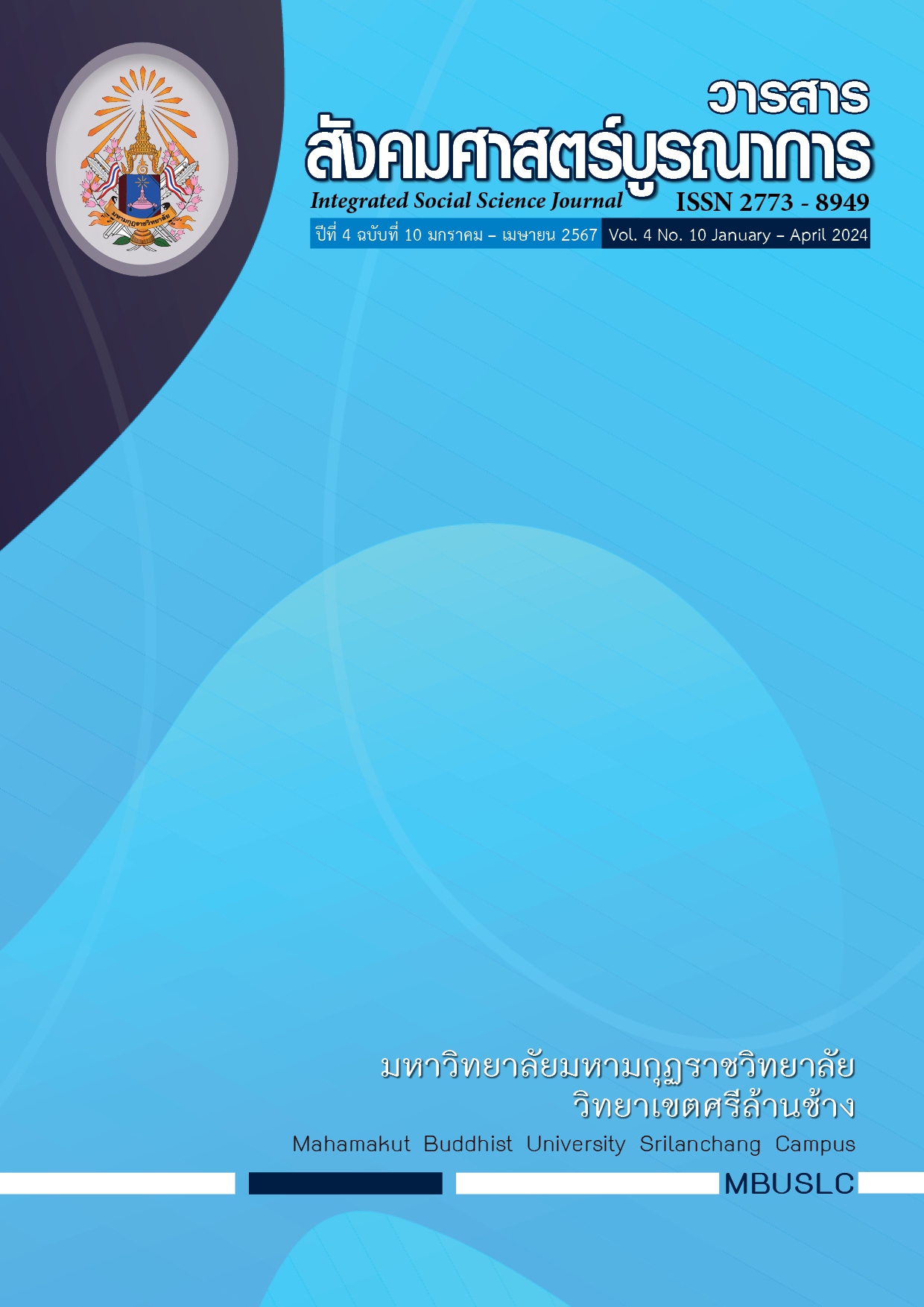GUIDELINES FOR ACADEMIC AFFAIRS ADMINISTRATION OF SCHOOL IN THE DIGITAL ERA TO EXCELLENCE UNDER THE SECONDARY EDUCATIONAL SERVICE AREA LOEI NONGBUALAMPHU
Main Article Content
Abstract
Academic administration was important to administration in educational institutions. Executives must make this a top priority. The purposes of this research were to 1) study the current condition desired condition and the necessary needs for academic affairs administration of school in the digital era to excellence under the Secondary Educational Service Area Loei Nongbua Lamphu, 2) study the academic administration guidelines of educational institutions in the digital era towards excellence and 3) evaluate the academic administration guidelines of educational institutions in the digital era towards excellence. The research method was divided into three phases. Phase 1 was to study of the current condition, desired condition and the necessary needs of academic administration of educational institutions in the digital era towards excellence. The sample of the research was 329 directors and teachers. The sample size was determined. Using Krejcie & Morgan's ready-made table and using stratified random sampling. The tool was a questionnaire. Phase 2 was to study the educational administration guidelines for educational institutions in the digital age towards excellence. Phase 1: Multi-case study. The target group were three educational institution administrators. The tool was a semi-structured questionnaire and step 2 was a group discussion. The group of key informants were ten experts. The tool was a group discussion recording. Phase 3 was to evaluate academic administration guidelines of educational institutions in the digital era towards excellence. The evaluation was based on five experts. The tool was a quantitative data analysis assessment by finding frequencies, percentages, standard deviations and finding indexes of essential needs and qualitative data analysis using descriptive analysis. The results of the study were as follows: 1. The overall current condition was at a high level ( = 3.50, S.D. = 0.61), a desirable condition. Overall, it was at the highest level ( = 4.81, S.D. = 0.30) and the importance index of the top 3 PNIModified needs is the development of learning resources (PNIModified= 0.424), the development of media, innovation, and Educational technology (PNI Modified = 0.386) and learning process development (PNI Modified = 0.384), respectively. 2. The Guidelines for academic administration of educational institutions in the digital era towards excellence, with 5 elements, ranked in order of importance, the first 3 are: (1) Development of learning resources, consisting of 3 methods of operation, 7 conditions for success, 4 methods of practice (2) Media development Educational innovation and technology consists of 3 methods of operation, 6 conditions of success, 4 methods of practice and (3) Development of the learning process consists of 3 methods of operation, 7 conditions of success, 4 methods of practice. 3) Results of the evaluation of educational administration guidelines for educational institutions in the digital era towards excellence. Overall, there were average values from highest to lowest, they are: learning process development ( = 5.00), educational guidance ( = 4.93), and media development, innovation and educational technology ( = 4.90) respectively.
Article Details

This work is licensed under a Creative Commons Attribution-NonCommercial-NoDerivatives 4.0 International License.
บทความที่ได้รับการพิจารณาจากคณะกรรมการผู้ทรงคุณวุฒิและเผยแผ่ในวารสารฉบับนี้ เป็นทัศนคติและข้อคิดเห็นส่วนบุคคลของผู้เขียนแต่ละท่าน ไม่ถือว่าเป็นทัศนะคติและความรับผิดชอบ
ของบรรณาธิการ
บทความ ข้อมูล เนื้อหา รูปภาพ ฯลฯ ที่ได้รับการตีพิมพ์ในวารสารสังคมศาสตร์บูรณาการ ถือเป็นลิขสิทธิ์ของวารสารสังคมศาสตร์บูรณาการ หากบุคคลหรือหน่วยงานใดต้องการนำทั้งหมดหรือส่วนหนึ่งส่วนใดไปเผยแพร่ต่อหรือเพื่อกระทำการใด ๆ จะต้องได้รับอนุญาตเป็นลายลักอักษรจากวารสารสังคมศาสตร์บูรณาการ ก่อนเท่านั้น
References
กระทรวงศึกษาธิการ. (2560). ตัวชี้วัดและหลักสูตรแกนกลาง (ฉบับปรับปรุง พ.ศ. 2560) ตามหลักสูตรแกนกลางการศึกษาขั้นพื้นฐาน พุทธศักราช 2551. สำนักคณะกรรมการศึกษาขั้นพื้นฐาน กระทรวงศึกษาธิการ, กรุงเทพมหานคร: โรงพิมพ์ชุมนุม สหกรณ์การเกษตรแห่งประเทศไทย จํากัด.
ชานนท์ คำปิวทา. (2565). รูปแบบการบริหารเพื่อส่งเสริมการจัดการเรียนรู้ในยุคดิจิทัลของครูโรงเรียนมัธยมศึกษา. วิทยานิพนธ์ กศ.ด. การบริหารการศึกษา, มหาวิทยาลัยนเรศวร.
บุญชม ศรีสะอาด. (2557). การวิจัยเบื้องต้น. กรุงเทพฯ : สุวีริยาสาส์น.
ปณิตา บัวเจริญ และคณะ. (2561). การบริหารงานแนะแนวของสถานศึกษาขั้นพื้นฐานระดับมัธยมศึกษาในกรุงเทพมหานคร. กรุงเทพมหานคร: สาขาวิชาการจัดการการศึกษา วิทยาลัยครุศาสตร์ มหาวิทยาลัยธุรกิจ บัณฑิตย์.
ปภาวดี โพธิ์งาม. (2558). แนวทางการบริหารงานวิชาการในโรงเรียนขนาดเล็ก สังกัดสำนักงานเขตพื้นที่การศึกษาประถมศึกษานครสวรรค์ เขต 1. วิทยานิพนธ์ ค.ม. (การบริหารการศึกษา). นครสวรรค์: บัณฑิตวิทยาลัย มหาวิทยาลัย ราชภัฏนครสวรรค์.
พระบุญลัท สุวรรณเดช. (2561). การบริหารงานวิชาการของโรงเรียนสังกัดสำนักงานเขตบางบอน กรุงเทพมหานคร. วิทยานิพนธ์ ศษ.ม. (การบริหารจัดการศึกษาและผู้นำทางการศึกษา). กรุงเทพมหานคร: บัณฑิตวิทยาลัยมหาวิทยาลัยสยาม.
มาลัย วงศ์ฤทัยวัฒนา. (2562). แนวทางการบริหารโรงเรียนขนาดเล็กยุคดิจิทัลสู่ความเป็นเลิศของสำนักงานเขตพื้นที่การศึกษาประถมศึกษาชัยนาท. ชัยนาท.
วราริณี มิ่งภู และคณะ. (2565). การศึกษาสภาพการบริหารงานวิชาการในยุคดิจิทัลของสถานศึกษาจังหวัดนครสวรรค์ สังกัดสำนักงานคณะกรรมการการอาชีวศึกษา. วิทยานิพนธ์ ค.ม. (การบริหารการศึกษา). นครสวรรค์: บัณฑิตวิทยาลัย มหาวิทยาลัยราชภัฏนครสวรรค์.
วันวดี กู้เมือง. (2560). ระบบเทคโนโลยีสารสนเทศมีความสำคัญต่อการศึกษาอย่างไร. สืบค้น 15 กุมภาพันธ์ 2566 จาก https://www.gotoknow.org/posts/427621
วิไล ปรึกษากร. (2558). นวัตกรรมการบริหารงานวิชาการของผู้บริหารสถานศึกษาขั้นพื้นฐาน. ดุษฎีนิพนธ์ ปร.ด. (การ บริหารการศึกษา). นครปฐม: บัณฑิตวิทยาลัย มหาวิทยาลัยศิลปากร.
วิไลพร คงอินทร์ และคณะ. (2559). การศึกษาปัญหาและแนวทางการพัฒนาการบริหารงานวิชาการ โรงเรียนจุฬาภรณราชวิทยาลัย สตูล (โรงเรียนวิทยาศาสตร์ภูมิภาค) สังกัดสำนักงานเขตพื้นที่การศึกษามัธยมศึกษา เขต 16. วิทยานิพนธ์มหาบัณฑิต (การบริหารการศึกษา). ชลบุรี: คณะศึกษาศาสตร์ มหาวิทยาลัยบูรพา.
สารินทร์ เอี่ยมครอง. (2561). แนวทางการบริหารงานวิชาการของสถานศึกษาในจังหวัดชัยนาท สังกัดสำนักงานเขตพื้นที่การศึกษามัธยมศึกษา เขต 5. วิทยานิพนธ์ ค.ม. (การบริหารการศึกษา). นครสวรรค์: บัณฑิตวิทยาลัยมหาวิทยาลัยราชภัฏนครสวรรค์.
สุกัญญา แช่มช้อย. (2561). การบริหารสถานศึกษาในยุคดิจิทัล. กรุงเทพฯ: โรงพิมพ์แห่งจุฬาลงกรณ์มหาวิทยาลัย.
สำนักงานปลัดกระทรวงศึกษาธิการ. (2559). แผนปฏิบัติราชการประจำปีงบประมาณ 2560 ของสำนักงานปลัดกระทรวง ศึกษาธิการ. กรุงเทพฯ: สำนักนโยบายและยุทธศาสตร์.
สำนักงานเขตพื้นที่การศึกษามัธยมศึกษา เขต 19. (2563). คู่มือการปฏิบัติงานสำนักงานเขตพื้นที่การศึกษา. กลุ่มส่งเสริมการจัดการศึกษา. เลย: สำนักงานเขตพื้นที่การศึกษามัธยมศึกษา เขต 19.
สำนักงานเลขาธิการสภาการศึกษา. (2563). รายงาน เรียนออนไลน์ยุคโควิด-19: วิกฤตหรือโอกาสการศึกษาไทย. สืบค้น 15 กุมภาพันธ์ 2566, จาก http://backoffice.onec.go.th/uploads/Book/1779-file.pdf
สุกัญญา แช่มช้อย. (2561). การบริหารสถานศึกษาในยุคดิจิทัล School Management in Digital Era. พิมพ์ครั้งที่ 1. กรุงเทพมหานคร: สำนักพิมพ์แห่งจุฬาลงกรณ์มหาวิทยาลัย.
World Economic Forum. (2020). 4 ways COVID-19 could change how we educate future generation. Retrieved February 10, 2022, from https://www.weforum.org/agenda/2020/03/4-ways-covid-19-educationfuture-generations/.

